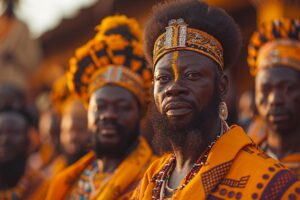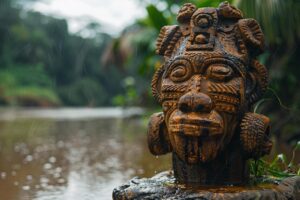Asase Yaa Goddess: The Mother Earth Deity in Akan Mythology

Asase Yaa Goddess, in Akan mythology, is revered as the powerful female spirit of the earth. Known for her role in creation and nurturing life, she is honored through rituals and ceremonies connecting with ancestors.
Asase Yaa symbolizes truth, peace, and the vital link between humanity and the land. Her legacy continues to influence Ghanaian culture today.
The Origin and Significance of Asase Yaa
In Akan mythology, Asase Yaa holds a central position as the powerful female spirit of the earth, embodying fertility and life-giving properties. The creation of Asase Yaa marks a pivotal moment in the Akan worldview, highlighting the essential role of the earth as a nurturing force.
Creation of Asase Yaa
According to Akan tradition, Asase Yaa was brought into existence by Nyame, the Creator, establishing her as a foundational figure in the pantheon. The significance of Asase Yaa’s creation lies in her close connection to the sustaining life force of the earth and her role in sustaining humanity.
Role of Asase Yaa as the Earth Goddess
As the Earth Goddess, Asase Yaa is revered for her ability to provide sustenance and nourishment to all living beings. Her presence in Akan cosmology underscores the essential interdependence between humanity and the land, emphasizing the importance of honoring and respecting the earth as a source of life.
Rituals and Ceremonies Involving Asase Yaa
Asase Yaa, the revered Goddess of the Akan people, is central to various rituals and ceremonies that play a significant role in their culture and traditions.
Libation and its Importance in Akan Culture
Libation holds a crucial place in the spiritual practices of the Akan community, serving as a means to honor and communicate with Asase Yaa.
Through the pouring of libations, the Akan seek to establish a connection with the earth and their ancestors.
Ceremonial Practices Related to Asase Yaa
- Ceremonial offerings to Asase Yaa involve intricate rituals that emphasize respect and reverence for the earth and the deity.
- Ritual dances and songs are performed in honor of Asase Yaa, symbolizing gratitude and seeking blessings for fertility and abundance.
- During naming ceremonies and funerals, specific rites are carried out to pay homage to Asase Yaa, acknowledging her role in the cycle of life and death.
The Akan people view these ceremonies as sacred and essential for maintaining harmony with Asase Yaa, ensuring her continued blessings and protection over their lives.
Asase Yaa in Akan Traditions and Beliefs
Asase Yaa holds a central place in Akan traditions and beliefs, embodying the deep connection between the earth and humanity. Through rituals and ceremonies, the Akan people honor and respect Asase Yaa in various aspects of their lives.
Asase Yaa’s Presence in Daily Life
- Asase Yaa symbolizes the nurturing and sustaining qualities of the earth in the daily lives of Akan people.
- Her presence is felt in the growth of crops, the flow of rivers, and the abundance of nature.
- Akan individuals acknowledge Asase Yaa’s role in providing sustenance and life to all beings.
Asase Yaa in Naming Ceremonies and Funerals
- During naming ceremonies, Asase Yaa is invoked to bless the newborn and protect their journey through life.
- Funerals are also a moment of reverence to Asase Yaa, seeking permission to lay the deceased to rest in the earth.
- Her presence brings comfort and guidance in times of transition and remembrance of ancestors.
Asase Yaa’s Symbolism and Representations
Asase Yaa as the Goddess of Truth and Peace
Asase Yaa is revered as the embodiment of truth and peace in Akan culture.
She represents the harmonious balance between honesty and serenity, guiding followers towards unity and understanding.
The Spiritual Connection with Ancestors through Asase Yaa
Through rituals and ceremonies involving Asase Yaa, the Akan people establish and maintain a spiritual bond with their ancestors. This connection serves as a bridge between the past and present, ensuring guidance and protection.
Reverence and Worship of Asase Yaa
Understanding the reverence and worship of Asase Yaa within Akan culture reveals a deep connection to the earth and ancestral traditions.
Adoration of Asase Yaa in Natural Settings
- Honoring Asase Yaa in the natural environment
- Practicing rituals to show respect for the earth
- Connecting with Asase Yaa through offerings and ceremonies
The Importance of Respecting and Caring for Mother Earth
- Recognizing the vital role of Asase Yaa in sustaining life
- Promoting sustainability and environmental consciousness
- Embracing the practice of caring for the land as a sacred duty
Asase Yaa in Contemporary Context
Asase Yaa’s Legacy and Continued Reverence
In modern Ghana, the legacy of Asase Yaa continues to shape cultural norms and practices.
Her enduring influence is evident in various aspects of Akan society.
Asase Yaa’s Enduring Impact on Akan Culture
The teachings and traditions associated with Asase Yaa remain deeply ingrained in Akan culture, guiding individuals in their daily lives and interactions.
Passing Down the Traditions of Asase Yaa to Future Generations
It is essential for the Akan people to pass on the rituals and knowledge surrounding Asase Yaa to younger generations, ensuring that her wisdom endures for years to come.
Asase Yaa’s Legacy and Continued Reverence
Asase Yaa’s legacy continues to shape Akan culture with her enduring influence and revered position. Through passing down traditions to future generations, the importance of respecting and revering Asase Yaa remains paramount.
Asase Yaa’s Enduring Impact on Akan Culture
Asase Yaa’s powerful presence in Akan traditions and beliefs has left a lasting impact on the cultural fabric of Ghana. Her role as the earth goddess and the connection to ancestors through her has become deeply ingrained in societal norms.
Passing Down the Traditions of Asase Yaa to Future Generations
The transmission of Asase Yaa’s teachings to future generations ensures that her significance is preserved and celebrated over time. Children are educated on the importance of honoring the earth and ancestral connections, maintaining the reverence for Asase Yaa in contemporary contexts.
.




















